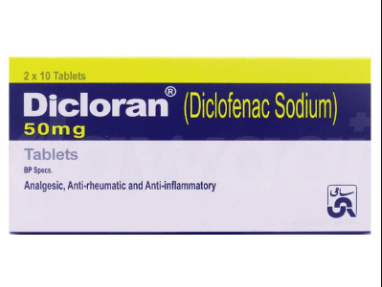Dicloran 50mg Tablet contains Diclofenac Sodium as its active ingredient. It belongs to the class of medications known as nonsteroidal anti-inflammatory drugs (NSAIDs). Diclofenac Sodium is a widely used analgesic (pain-relieving), anti-inflammatory, and antipyretic (fever-reducing) medication. It works by inhibiting the production of prostaglandins, which are substances in the body responsible for pain and inflammation.
Uses:
Dicloran 50mg Tablet is prescribed for various conditions, including:
- Pain Relief: It is effective in alleviating pain associated with arthritis, musculoskeletal disorders, dental pain, menstrual cramps, and postoperative pain.
- Inflammation Reduction: Diclofenac Sodium helps reduce inflammation caused by rheumatoid arthritis, osteoarthritis, ankylosing spondylitis, and other inflammatory conditions.
- Fever Reduction: It may be used to lower fever in conditions such as colds, flu, or other infections.
Side Effects:
Common side effects of Dicloran 50mg Tablet include:
- Gastrointestinal Upset: Nausea, indigestion, heartburn, and abdominal pain are common.
- Dizziness: Some individuals may experience dizziness or lightheadedness.
- Skin Reactions: Rarely, skin reactions like rash, itching, or hives may occur.
- Gastrointestinal Ulcers and Bleeding: Long-term use or high doses may increase the risk of gastrointestinal ulcers and bleeding.
Precautions:
- Cardiovascular Risk: Diclofenac Sodium may increase the risk of cardiovascular events, especially with long-term use or in patients with existing cardiovascular conditions.
- Renal Impairment: Use with caution in patients with renal impairment as it can impair kidney function.
- Hepatic Impairment: Patients with liver disease should use Diclofenac Sodium cautiously due to the risk of liver toxicity.
- Asthma: It may exacerbate asthma symptoms in some individuals.
- Elderly Patients: Elderly patients are more prone to side effects, so use should be cautious.
When Not to Use:
Dicloran 50mg Tablet should not be used in the following situations:
- Hypersensitivity or allergy to Diclofenac Sodium or other NSAIDs.
- History of asthma, urticaria, or allergic-type reactions to aspirin or other NSAIDs.
- Active gastrointestinal ulcers or bleeding.
- Severe heart, renal, or hepatic failure.
- Pregnancy, especially during the third trimester, due to potential harm to the fetus.
FAQ:
- How should I take Dicloran 50mg Tablet?
- Can I take Dicloran 50mg Tablet with food?
- Is it safe to use Dicloran 50mg Tablet during pregnancy?
- Can I drink alcohol while taking Dicloran 50mg Tablet?
- How long does it take for Dicloran 50mg Tablet to start working?






Reviews
There are no reviews yet.